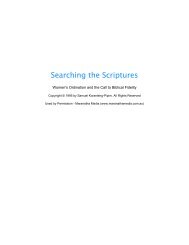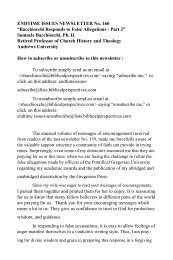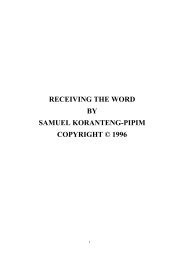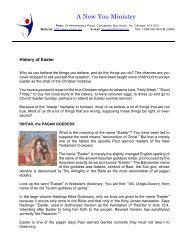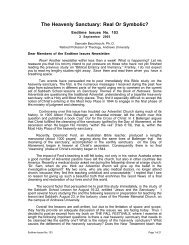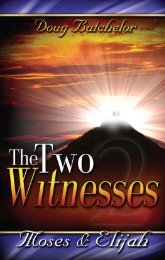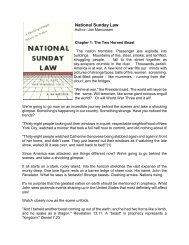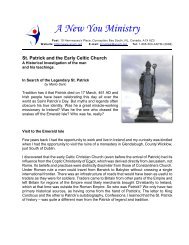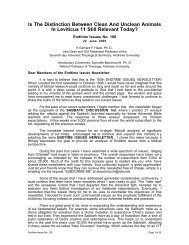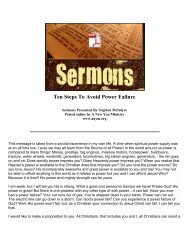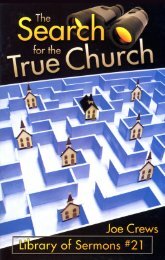Bible Readings for the Home Circleâ1914 - A New You Ministry
Bible Readings for the Home Circleâ1914 - A New You Ministry
Bible Readings for the Home Circleâ1914 - A New You Ministry
Create successful ePaper yourself
Turn your PDF publications into a flip-book with our unique Google optimized e-Paper software.
BIBLE READINGS<br />
“For rulers are not a terror to good works, but to <strong>the</strong> evil. . . . If thou<br />
do that which is evil, be afraid; <strong>for</strong> he beareth not <strong>the</strong> sword in vain: <strong>for</strong> he<br />
is <strong>the</strong> minister of God, a revenger to execute wrath upon him that doeth<br />
evil. Verses 3, 4.<br />
6. For whom is law made<br />
“Knowing this, that <strong>the</strong> law is not made <strong>for</strong> a righteous man, but <strong>for</strong><br />
<strong>the</strong> lawless and disobedient.” 1 Tim. 1:9. {476<br />
476}<br />
6. How are Christians admonished to respect civil authority<br />
“Put <strong>the</strong>m in mind to be subject to principalities and powers, to obey<br />
magistrates, to be ready to every good work.” Titus 3:1. “Submit yourselves<br />
to every ordinance of man <strong>for</strong> <strong>the</strong> Lord’s sake: whe<strong>the</strong>r it be to <strong>the</strong><br />
king, as supreme; or unto governors, as unto <strong>the</strong>m that are sent by him <strong>for</strong><br />
<strong>the</strong> punishment of evil-doers, and <strong>for</strong> <strong>the</strong> praise of <strong>the</strong>m that do well. . . .<br />
Honor all men. Love <strong>the</strong> bro<strong>the</strong>rhood. Fear God. Honor <strong>the</strong> king.” 1 Peter<br />
2:13–17. “For <strong>for</strong> this cause pay ye tribute also: <strong>for</strong> <strong>the</strong>y are God’s ministers,<br />
attending continually upon this very thing. Render <strong>the</strong>re<strong>for</strong>e to all<br />
<strong>the</strong>ir dues: tribute to whom tribute is due; custom to whom custom; fear<br />
to whom fear; honor to whom honor.” Rom. 13:6, 7.<br />
7. In what words does Christ show that <strong>the</strong>re is ano<strong>the</strong>r realm outside<br />
of Caesar’s, or civil government<br />
“Render <strong>the</strong>re<strong>for</strong>e unto Caesar <strong>the</strong> things which are Caesar’s; and<br />
unto God <strong>the</strong> things that are God’s.” Matt. 22:21.<br />
8. To whom alone did He say worship is to be rendered<br />
“Thou shalt worship <strong>the</strong> Lord thy God, and Him only shalt thou serve.”<br />
Matt. 4:10.<br />
9. What decree did King Nebuchadnezzar once make respecting worship<br />
“To you it is commanded, O people, nations, and languages, that at<br />
what time ye hear <strong>the</strong> sound of <strong>the</strong> cornet, flute, harp, sackbut, psaltery,<br />
dulcimer, and all kinds of music, ye fall down and worship <strong>the</strong> golden<br />
image that Nebuchadnezzar <strong>the</strong> king hath set up. And whoso falleth not<br />
down and worshipeth shall <strong>the</strong> same hour be cast into <strong>the</strong> midst of a<br />
burning fiery furnace.” Dan. 3:4–6.<br />
NOTE .— This decree was in direct conflict with <strong>the</strong> second commandment<br />
of God’s law, which <strong>for</strong>bids making, bowing down to, and serving<br />
images. It was religious, idolatrous, and persecuting in character.<br />
10. What answer did <strong>the</strong> three Hebrew captives, Shadrach, Meshach,<br />
and Abed-nego, return when asked by <strong>the</strong> king why <strong>the</strong>y had not<br />
fallen down and worshiped <strong>the</strong> golden image, as he had commanded<br />
“Shadrach, Meshach, and Abed-nego, answered and said to <strong>the</strong> king,<br />
O Nebuchadnezzar, we are not careful to answer <strong>the</strong>e in this matter. If it<br />
THE POWERS THAT BE<br />
be so, our God whom we serve is able to deliver us from <strong>the</strong> burning fiery<br />
furnace, and He will deliver us out of thine hand, O king. But if not, be it<br />
known unto <strong>the</strong>e, {477<br />
477} O king, that we will not serve thy gods, nor<br />
worship <strong>the</strong> golden image which thou hast set up.” Verses 16–18.<br />
11. What did Nebuchadnezzar <strong>the</strong>n do<br />
“Then was Nebuchadnezzar full of fury, and <strong>the</strong> <strong>for</strong>m of his visage<br />
was changed against Shadrach, Meshach, and Abed-nego: . . . and he<br />
commanded <strong>the</strong> most mighty men that were in his army to bind Shadrach,<br />
Meshach, and Abed-nego, and to cast <strong>the</strong>m into <strong>the</strong> burning fiery furnace.”<br />
Verses 19, 20.<br />
12. After <strong>the</strong>ir miraculous deliverance, what did Nebuchadnezzar say<br />
“Then Nebuchadnezzar spake, and said, Blessed be <strong>the</strong> God of<br />
Shadrach, Meshach, and Abed-nego, who hath sent His angel, and delivered<br />
His servants that trusted in Him, and have changed <strong>the</strong> king’s word,<br />
and yielded <strong>the</strong>ir bodies, that <strong>the</strong>y might not serve nor worship any god,<br />
except <strong>the</strong>ir own God.” Verse 28.<br />
NOTE .— By preserving <strong>the</strong>se men in <strong>the</strong> fire, and thus changing <strong>the</strong><br />
king’s word, God was demonstrating be<strong>for</strong>e all <strong>the</strong> world, through this<br />
greatest of <strong>the</strong>n-existing earthly kingdoms, that, with <strong>the</strong> question of<br />
religion, civil governments can of right have nothing whatsoever to do;<br />
that religion is a realm outside <strong>the</strong> legitimate sphere of civil authority;<br />
and that every individual should be left free to worship, or not to worship,<br />
according to <strong>the</strong> dictates of his own conscience. The lesson to be<br />
learned from this is that, although ordained of God, civil governments<br />
are not ordained to direct or oppress men in religious matters.<br />
13. How only did <strong>the</strong> envious princes and rulers under King Darius<br />
conclude that <strong>the</strong>y could effect <strong>the</strong> downfall of Daniel<br />
“Then said <strong>the</strong>se men, We shall not find any occasion against this Daniel,<br />
except we find it against him concerning <strong>the</strong> law of his God.” Dan. 6:5.<br />
14. To this end, what decree did <strong>the</strong>y prevail upon <strong>the</strong> king to make<br />
and sign<br />
“That whosoever shall ask a petition of any God or man <strong>for</strong> thirty<br />
days, save of <strong>the</strong>e, O king, he shall be cast into <strong>the</strong> den of lions.” Verse 7.<br />
NOTE .— Unlike <strong>the</strong> decree of Nebuchadnezzar, this decree <strong>for</strong>bade <strong>the</strong><br />
worship of <strong>the</strong> true God, and was <strong>the</strong>re<strong>for</strong>e in direct conflict with <strong>the</strong> first<br />
commandment, which <strong>for</strong>bids <strong>the</strong> worship of any o<strong>the</strong>r than <strong>the</strong> true<br />
God. Like it, however, it was religious and persecuting in character.<br />
15. How did Daniel regard this decree<br />
“Now when Daniel knew that <strong>the</strong> writing was signed, he went into his<br />
house; and his windows being open in his chamber toward Jerusalem, he<br />
kneeled upon his knees three times a day, {479<br />
479} and prayed, and gave<br />
thanks be<strong>for</strong>e his God, as he did a<strong>for</strong>etime.” Verse 10.




